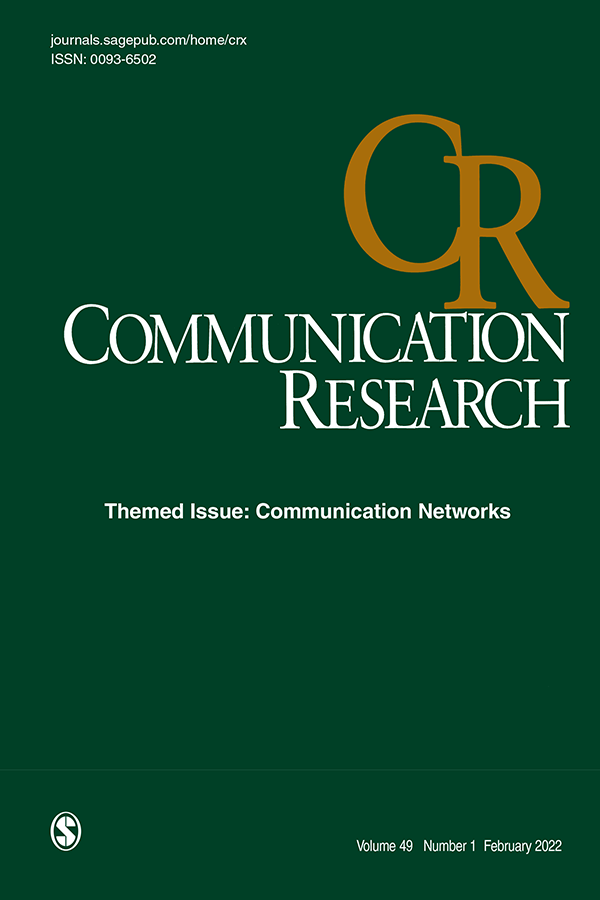Media Cynicism, Media Skepticism and Automatic Media Trust: Explicating Their Connection with News Processing and Exposure
IF 3.2
1区 文学
Q1 COMMUNICATION
引用次数: 0
Abstract
In an era of increasing attention to media trust, some have argued that differentiating between media cynicism and media skepticism (as both attitudinal and behavioral concepts) can advance a more nuanced understanding of media trust and its implications. While previous efforts conceptualized cynicism and skepticism as separate discrete phenomena, this allows the seemingly illogical possibility that some people would score high on both cynicism and skepticism. Additionally, these previous studies failed to demonstrate whether media cynicism and skepticism actually matter for audience reading and processing of news media content. After conceptualizing these terms on a single continuum varying between automatic rejection to automatic trust, Study 1 offers a procedure to test whether cynics process news stories faster, and whether skeptics’ trust in different news stories varies more compared to cynics’. Given that skepticism was hypothesized to reflect more deliberate thinking, we also tested whether media skeptics provide different kinds of justifications when asked to explain their evaluations of specific news stories, compared to cynics and trustors. Studies 2 and 3 test theoretically-driven hypotheses about automatic-trust, skepticism and cynicism and find that cynics’ and automatic trustors’ general evaluations of media are based on partisan reasoning and skeptics’ evaluation of the media is independent from their political ideology. Skeptical audiences were also found to consume more news and from a diversity of sources.媒体玩世不恭、媒体怀疑和媒体自动信任:与新闻加工和曝光的关系
在一个越来越关注媒体信任的时代,一些人认为区分媒体犬儒主义和媒体怀疑主义(作为态度和行为概念)可以促进对媒体信任及其含义的更细致的理解。虽然以前的努力将犬儒主义和怀疑主义概念为独立的离散现象,但这允许看似不合逻辑的可能性,即一些人在犬儒主义和怀疑主义上都得分很高。此外,这些先前的研究未能证明媒体犬儒主义和怀疑主义是否真的对受众阅读和处理新闻媒体内容有影响。在对这些术语在自动拒绝和自动信任之间的单一连续体进行概念化之后,研究1提供了一个程序来测试愤世嫉俗者是否更快地处理新闻故事,以及怀疑论者对不同新闻故事的信任是否比愤世嫉俗者变化更大。考虑到怀疑被假设为反映了更深思熟虑的思考,我们还测试了媒体怀疑论者在被要求解释他们对特定新闻故事的评价时,与愤世嫉俗者和信任者相比,是否提供了不同的理由。研究2和3检验了关于自动信任、怀疑主义和玩世不恭的理论驱动假设,发现玩世不恭者和自动信任者对媒体的总体评价基于党派推理,怀疑论者对媒体的评价独立于他们的政治意识形态。持怀疑态度的观众也会消费更多来自不同来源的新闻。
本文章由计算机程序翻译,如有差异,请以英文原文为准。
求助全文
约1分钟内获得全文
求助全文
来源期刊

Communication Research
COMMUNICATION-
CiteScore
17.10
自引率
0.00%
发文量
20
期刊介绍:
Empirical research in communication began in the 20th century, and there are more researchers pursuing answers to communication questions today than at any other time. The editorial goal of Communication Research is to offer a special opportunity for reflection and change in the new millennium. To qualify for publication, research should, first, be explicitly tied to some form of communication; second, be theoretically driven with results that inform theory; third, use the most rigorous empirical methods; and fourth, be directly linked to the most important problems and issues facing humankind. Critieria do not privilege any particular context; indeed, we believe that the key problems facing humankind occur in close relationships, groups, organiations, and cultures.
 求助内容:
求助内容: 应助结果提醒方式:
应助结果提醒方式:


